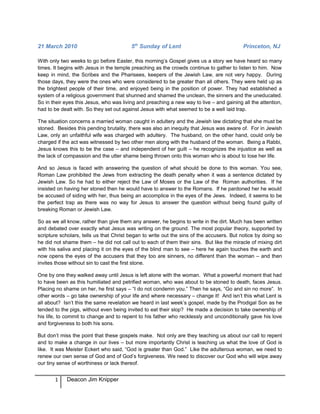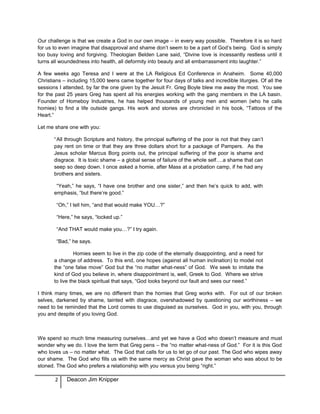Homily: FIfth Sunday in Lent C 2013
- 1. 21 March 2010 5th Sunday of Lent Princeton, NJ With only two weeks to go before Easter, this morning’s Gospel gives us a story we have heard so many times. It begins with Jesus in the temple preaching as the crowds continue to gather to listen to him. Now keep in mind, the Scribes and the Pharisees, keepers of the Jewish Law, are not very happy. During those days, they were the ones who were considered to be greater than all others. They were held up as the brightest people of their time, and enjoyed being in the position of power. They had established a system of a religious government that shunned and shamed the unclean, the sinners and the uneducated. So in their eyes this Jesus, who was living and preaching a new way to live – and gaining all the attention, had to be dealt with. So they set out against Jesus with what seemed to be a well laid trap. The situation concerns a married woman caught in adultery and the Jewish law dictating that she must be stoned. Besides this pending brutality, there was also an inequity that Jesus was aware of. For in Jewish Law, only an unfaithful wife was charged with adultery. The husband, on the other hand, could only be charged if the act was witnessed by two other men along with the husband of the woman. Being a Rabbi, Jesus knows this to be the case – and independent of her guilt – he recognizes the injustice as well as the lack of compassion and the utter shame being thrown onto this woman who is about to lose her life. And so Jesus is faced with answering the question of what should be done to this woman. You see, Roman Law prohibited the Jews from extracting the death penalty when it was a sentence dictated by Jewish Law. So he had to either reject the Law of Moses or the Law of the Roman authorities. If he insisted on having her stoned then he would have to answer to the Romans. If he pardoned her he would be accused of siding with her, thus being an accomplice in the eyes of the Jews. Indeed, it seems to be the perfect trap as there was no way for Jesus to answer the question without being found guilty of breaking Roman or Jewish Law. So as we all know, rather than give them any answer, he begins to write in the dirt. Much has been written and debated over exactly what Jesus was writing on the ground. The most popular theory, supported by scripture scholars, tells us that Christ began to write out the sins of the accusers. But notice by doing so he did not shame them – he did not call out to each of them their sins. But like the miracle of mixing dirt with his saliva and placing it on the eyes of the blind man to see – here he again touches the earth and now opens the eyes of the accusers that they too are sinners, no different than the woman – and then invites those without sin to cast the first stone. One by one they walked away until Jesus is left alone with the woman. What a powerful moment that had to have been as this humiliated and petrified woman, who was about to be stoned to death, faces Jesus. Placing no shame on her, he first says – “I do not condemn you.” Then he says, “Go and sin no more”. In other words – go take ownership of your life and where necessary – change it! And isn’t this what Lent is all about? Isn’t this the same revelation we heard in last week’s gospel, made by the Prodigal Son as he tended to the pigs, without even being invited to eat their slop? He made a decision to take ownership of his life, to commit to change and to repent to his father who recklessly and unconditionally gave his love and forgiveness to both his sons. But don’t miss the point that these gospels make. Not only are they teaching us about our call to repent and to make a change in our lives – but more importantly Christ is teaching us what the love of God is like. It was Meister Eckert who said, “God is greater than God.” Like the adulterous woman, we need to renew our own sense of God and of God’s forgiveness. We need to discover our God who will wipe away our tiny sense of worthiness or lack thereof. 1 Deacon Jim Knipper
- 2. Our challenge is that we create a God in our own image – in every way possible. Therefore it is so hard for us to even imagine that disapproval and shame don’t seem to be a part of God’s being. God is simply too busy loving and forgiving. Theologian Belden Lane said, “Divine love is incessantly restless until it turns all woundedness into health, all deformity into beauty and all embarrassment into laughter.” A few weeks ago Teresa and I were at the LA Religious Ed Conference in Anaheim. Some 40,000 Christians – including 15,000 teens came together for four days of talks and incredible liturgies. Of all the sessions I attended, by far the one given by the Jesuit Fr. Greg Boyle blew me away the most. You see for the past 25 years Greg has spent all his energies working with the gang members in the LA basin. Founder of Homeboy Industries, he has helped thousands of young men and women (who he calls homies) to find a life outside gangs. His work and stories are chronicled in his book, “Tattoos of the Heart.” Let me share one with you: “ All through Scripture and history, the principal suffering of the poor is not that they can’t pay rent on time or that they are three dollars short for a package of Pampers. As the Jesus scholar Marcus Borg points out, the principal suffering of the poor is shame and disgrace. It is toxic shame – a global sense of failure of the whole self….a shame that can seep so deep down. I once asked a homie, after Mass at a probation camp, if he had any brothers and sisters. “Yeah,” he says, “I have one brother and one sister,” and then he’s quick to add, with emphasis, “but there’re good.” “Oh,” I tell him, “and that would make YOU…?” “Here,” he says, “locked up.” “And THAT would make you…?” I try again. “Bad,” he says. Homies seem to live in the zip code of the eternally disappointing, and a need for a change of address. To this end, one hopes (against all human inclination) to model not the “one false move” God but the “no matter what-ness” of God. We seek to imitate the kind of God you believe in, where disappointment is, well, Greek to God. Where we strive to live the black spiritual that says, “God looks beyond our fault and sees our need.” I think many times, we are no different than the homies that Greg works with. For out of our broken selves, darkened by shame, tainted with disgrace, overshadowed by questioning our worthiness – we need to be reminded that the Lord comes to use disguised as ourselves. God in you, with you, through you and despite of you loving God. We spend so much time measuring ourselves…and yet we have a God who doesn’t measure and must wonder why we do. I love the term that Greg pens – the “no matter what-ness of God.” For it is this God who loves us – no matter what. The God that calls for us to let go of our past. The God who wipes away our shame. The God who fills us with the same mercy as Christ gave the woman who was about to be stoned. The God who prefers a relationship with you versus you being “right.” 2 Deacon Jim Knipper
- 3. In the end of the Gospel we hear that everyone walked away. The Scribes and Pharisees departed…the accusers left…and the crowds dropped their stones leaving only the woman and Jesus facing each other. And so it is with you and me – for this is the relationship we have with Christ, where there is no shame – only forgiveness…no shunning – only acceptance…no stones - only a warm embrace…no admonishment but the call to see our own imperfections – the call to change our ways, the Lenten call to let go of our past and to be open to start each day anew in the unconditional love of our good and gracious God. 3 Deacon Jim Knipper



